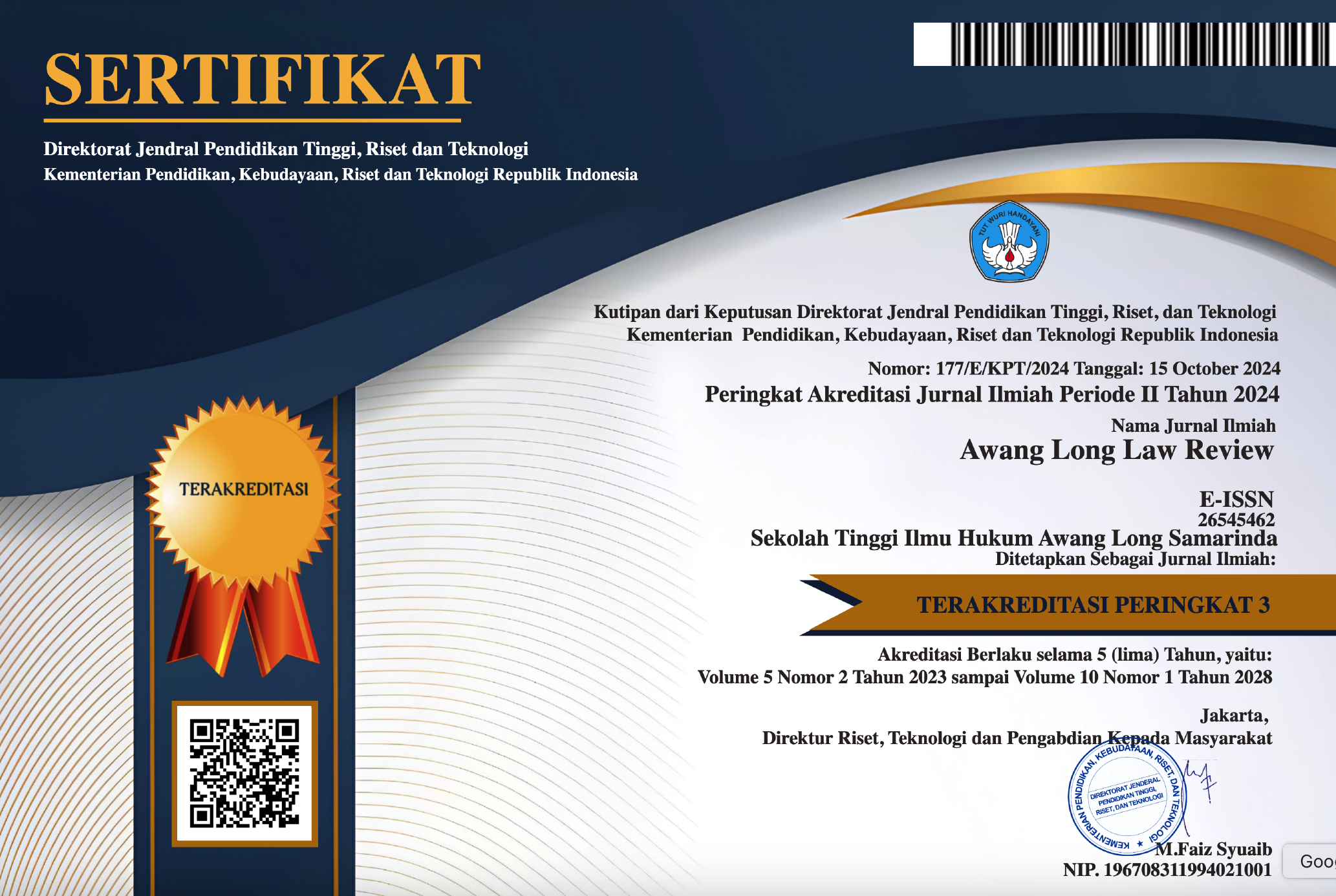JURIDICAL ANALYSIS OF THE RIGHT OF INQUIRY OF THE HOUSE OF REPRESENTATIVES IN PERFORMING THE SUPERVISORY FUNCTION ACCORDING TO INDONESIAN CONSTITUTIONAL LAW
Abstract
The right of inquiry of the House of Representatives is a right to conduct an investigation owned by the House of Representatives that decides that the implementation of a law in government policies that is important, strategic, and has a wide impact on community life, the nation, and the state is allegedly contrary to legislation. The right of inquiry of the House relating to the exercise of the supervisory functions of the House is “an institutionalized system, involving the effectiveness and regularity of restrictions on government actions. In Indonesian constitutional practice, the right of inquiry is rarely implemented. Twice executed during the reign of the old order and twice executed during the reign of the new order. The use of the right of inquiry in the current presidential system shows a significant increase. This study uses normative juridical methods that are descriptive and analytical. Basically, the right of inquiry is a constitutional right of the DPR in the constitutional system as part of carrying out the function of supervision and balance of the executive. As a result of the legal application of the right of inquiry, the House of Representatives can exercise the right to express an opinion.
Downloads
References
———. “The Implementation of Simultaneous Local Elections: An Overview of Constitutional Law and Its Impact on Democracy in Indonesia.†SIGn Jurnal Hukum 5, no. 1 (2023): 102–113. https://doi.org/10.37276/sjh.v5i1.262.
———. Pengantar Ilmu Hukum Tata Negara. Jakarta: Rajawali Pers, 2010.
A.M. Fatwa, Melanjutkan Reformasi Membangun Demokrasi (Jakarta: RajaGrafindo Persada, 2004), 97.
Asshiddiqie, Jimly. Hukum Tata Negara Dan Pilar-Pilar Demokrasi. Jakarta: Sinar Grafika, 2012.
Fatwa, A.M. Melanjutkan Reformasi Membangun Demokrasi. Jakarta: RajaGrafindo Persada, 2004.
Fuady, Munir. Teori Negara Hukum Modern (Rechtstaat). Bandung: Refika Aditama, 2011.
Haryani, Riastri. “Aspek Hukum Verifikasi Faktual Partai Politik Peserta Pemilu.†Begawan Abioso 13, no. 2 (2022): 77–88. https://doi.org/10.37893/abioso.v13i2.189.
Huda, Ni’matul. Politik Ketatanegaraan Indonesia: Kajian Terhadap Dinamika Perubahan UUD 1945. Yogyakarta: FH UII Press, 2003.
Janpatar Simamora, “Tafsir Makna Negara Hukum Dalam Perspektif Undang-Undang Dasar Negara Republik Indonesia Tahun 1945,†Jurnal Dinamika Hukum 14, no. 3 (2014): 547–561, https://doi.org/10.20884/1.jdh.2014.14.3.318.
Jimly Asshiddiqie, Hukum Tata Negara Dan Pilar-Pilar Demokrasi (Jakarta: Sinar Grafika, 2012), 16.
Jimly Asshiddiqie, Pengantar Ilmu Hukum Tata Negara (Jakarta: Rajawali Pers, 2010), 11.
Labolo, Muhadam. Memahami Ilmu Pemerintahan: Suatu Kajian, Teori, Konsep, Dan Pengembangan. Jakarta: Raja Grafindo Persada, 2011.
Law of the Republic of Indonesia Number 17 of 2014 the People’s Consultative Assembly, the House of Representatives, the House of Regional Representatives, and the Regional House of Representatives (State Gazette of the Republic of Indonesia of 2014 Number 5568), https://www.dpr.go.id/dokjdih/document/uu/UU_2014_17.pdf, Article 79 paragraph (3).
Muhadam Labolo, Memahami Ilmu Pemerintahan: Suatu Kajian, Teori, Konsep, Dan Pengembangan (Jakarta: Raja Grafindo Persada, 2011), 114.
Muhadam Labolo, Memahami Ilmu Pemerintahan: Suatu Kajian, Teori, Konsep, Dan Pengembangan (Jakarta: Raja Grafindo Persada, 2011), 114.
Munir Fuady, Teori Negara Hukum Modern (Rechtstaat) (Bandung: Refika Aditama, 2011), 45.
Ni’matul Huda, Politik Ketatanegaraan Indonesia: Kajian Terhadap Dinamika Perubahan UUD 1945 (Yogyakarta: FH UII Press, 2003), 32.
Nugraha, Wisnu. “Fungsi Legislasi Menurut Undang-Undang Dasar Tahun 1945 (Studi Kasus Badan Legislasi DPR RI Periode 2004-2009).†Binamulia Hukum 7, no. 2 (2018): 157–168. https://doi.org/10.37893/jbh.v7i2.322.
Riastri Haryani, “Aspek Hukum Verifikasi Faktual Partai Politik Peserta Pemilu,†Begawan Abioso 13, no. 2 (2022): 77–88, https://doi.org/10.37893/abioso.v13i2.189.
Riastri Haryani, “The Implementation of Simultaneous Local Elections: An Overview of Constitutional Law and Its Impact on Democracy in Indonesia,†SIGn Jurnal Hukum 5, no. 1 (2023): 102–113, https://doi.org/10.37276/sjh.v5i1.262.
Riastri Haryani, “The Implementation of Simultaneous Local Elections: An Overview of Constitutional Law and Its Impact on Democracy in Indonesia,†SIGn Jurnal Hukum 5, no. 1 (2023): 102–113, https://doi.org/10.37276/sjh.v5i1.262.
Simamora, Janpatar. “Tafsir Makna Negara Hukum Dalam Perspektif Undang-Undang Dasar Negara Republik Indonesia Tahun 1945.†Jurnal Dinamika Hukum 14, no. 3 (2014): 547–561. https://doi.org/10.20884/1.jdh.2014.14.3.318.
Soekanto, Soerjono, and Sri Mamudji. Penelitian Hukum Normatif: Suatu Tinjauan Singkat. Jakarta: RajaGrafindo Persada, 2012.
Soekanto, Soerjono. Pengantar Penelitian Hukum. Jakarta: UI Press, 2008.
Soemantri, Sri. Hukum Tata Negara Indonesia: Pemikiran Dan Pandangan. Bandung: Remaja Rosdakarya, 2020.
Soerjono Soekanto and Sri Mamudji, Penelitian Hukum Normatif: Suatu Tinjauan Singkat (Jakarta: RajaGrafindo Persada, 2012), 62.
Soerjono Soekanto, Pengantar Penelitian Hukum (Jakarta: UI Press, 2008), 3.
Sri Soemantri, Hukum Tata Negara Indonesia: Pemikiran Dan Pandangan (Bandung: Remaja Rosdakarya, 2020), 285.
The 1945 Constitution of the Republic of Indonesia. https://www.dpr.go.id/jdih/uu1945.
Wisnu Nugraha, “Fungsi Legislasi Menurut Undang-Undang Dasar Tahun 1945 (Studi Kasus Badan Legislasi DPR RI Periode 2004-2009),†Binamulia Hukum 7, no. 2 (2018): 157–168, https://doi.org/10.37893/jbh.v7i2.322.
Copyright (c) 2023 Riastri Haryani, Oki Sumiyanto

This work is licensed under a Creative Commons Attribution-ShareAlike 4.0 International License.







